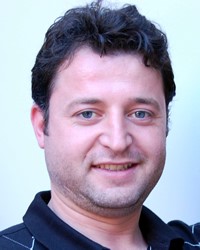Turk in Australia

Photo Source:
Anonymous
|
Send Joshua Project a map of this people group.
|
| People Name: | Turk |
| Country: | Australia |
| 10/40 Window: | No |
| Population: | 65,000 |
| World Population: | 66,822,900 |
| Primary Language: | Turkish |
| Primary Religion: | Islam |
| Christian Adherents: | 0.20 % |
| Evangelicals: | 0.15 % |
| Scripture: | Complete Bible |
| Ministry Resources: | Yes |
| Jesus Film: | Yes |
| Audio Recordings: | Yes |
| People Cluster: | Turkish |
| Affinity Bloc: | Turkic Peoples |
| Progress Level: |
|
Introduction / History
The Turkish youths in Australia, "were uncomfortable in Turkey culturally and were even more uncomfortable in Australia. It's the same old thing, they don't belong anywhere, or at least that is how they feel." These are the words of a former missionary to the Turks in Australia. Most of the Turks in Australia came to that country after WWII when Australia welcomed those displaced by the war. In the ensuing 60 plus years, the next generation of Turks have had enough time to feel somewhat Australian, and not as Turkish as their parents and grandparents. One of the issues that keep them from being fully Australian is their Islamic religion. Australia is primarily Christian and secular humanist. After the July 2005 terrorist attack in London, Australians felt threatened by Muslims in their own country. Those who wanted to live by sharia (i.e., Islamic) Law in Australia were bluntly told by government officials that this was not the country for them. But like their Muslim cousins in Turkey, the ethnic Turks in Australia are usually Muslim in name only. They would not want to live under sharia Law. Though they would not think of becoming a Christian, they would not consider leaving the religion of their fathers either. They speak English, and there are plenty of Christian materials available to them.
What Are Their Lives Like?
They are a very sincere people who place a high value on honor. They rely strongly on group solidarity, or trust in one's own group. Such groups would include one's village, family, friends, or schoolmates. Similarly, Australia's Turkish communities remain strong in their community bonds. Geographically, Turks in Australia concentrate in particular parts of the country—this has led to maintaining specific cultural traditions across the generations. A moderate form of Islam and their Turkish language symbolize Turkish Australian culture. Numerous private schools, including various Turkish colleges, help maintain the key role of the Turkish language among Australian Turks. Turkish language newspapers, radio broadcasts, and satellite television are widespread among Turks in Australia. Tens of thousands of Turkish Australians are still registered to vote in Turkey's elections. For example, in a referendum in Turkey in 2018, there was campaigning in Australia, and many Australian Turks voted in this referendum. To facilitate expat Turks in Australia meeting with other Turk expats there, an organization known as InterNations was established in 2007. It helps Turk expats in Australia to meet with other Turkish expats, to become accustomed to the Australian way of life and mentality, and to get help with practical needs in Australia. Turkish expats can join activities, tours, and social gatherings with other Turkish expats throughout Australia, including Canberra, Melbourne, Perth, the Gold Coast, Sydney, Brisbane, and Adelaide. The traditions of family loyalty, marriage and social organization, and segregation of male and female roles shape the identities of Turkish youths in Australia. Mixed with such tradition is the reality that Turks in Australia have been strongly secularized. As for marriage inside most Turkish communities, parents often arrange their children's marriages. Weddings usually take place between two young people who are in their teens. Though marriages are not always arranged, if a university student meets someone he would like to marry at school, they obtain advice from parents before there is a wedding. In such a case, the "dating classmates" are not allowed to go out by themselves, but only with groups of friends. Otherwise, criticisms and rumors may spread in their communities. Turks are also a very sensitive people. For example, they do not appreciate the criticisms that Westerners sometimes write about them or about their past brutal ways. Their sensitivity can be clearly seen by comparing two proverbs of a similar theme. In the United States, a well-known proverb says, "Sticks and stones may break my bones, but words will never hurt me." The Turkish proverb says, "The hurt of a stick dies away, but words hurt forever."
What Are Their Beliefs?
Australian Turks regard themselves as Sunni Muslim, though their devotion varies. Some view Islam as a guiding force in their lives while others are more secular in their worldview. For almost all of them, however, Islam is part of their identity.
Prayer Points
Pray for the fervent believers to reach out in faith and love to the Muslim Turks among them. Pray for a spiritual hunger among Turks that will be satisfied by none other than the only Savior, Jesus Christ. Pray for a Disciple Making Movement among Turks to spread far and wide throughout Australia. Pray for the Lord to provide for all the spiritual and economic needs of the Turks in Australia.